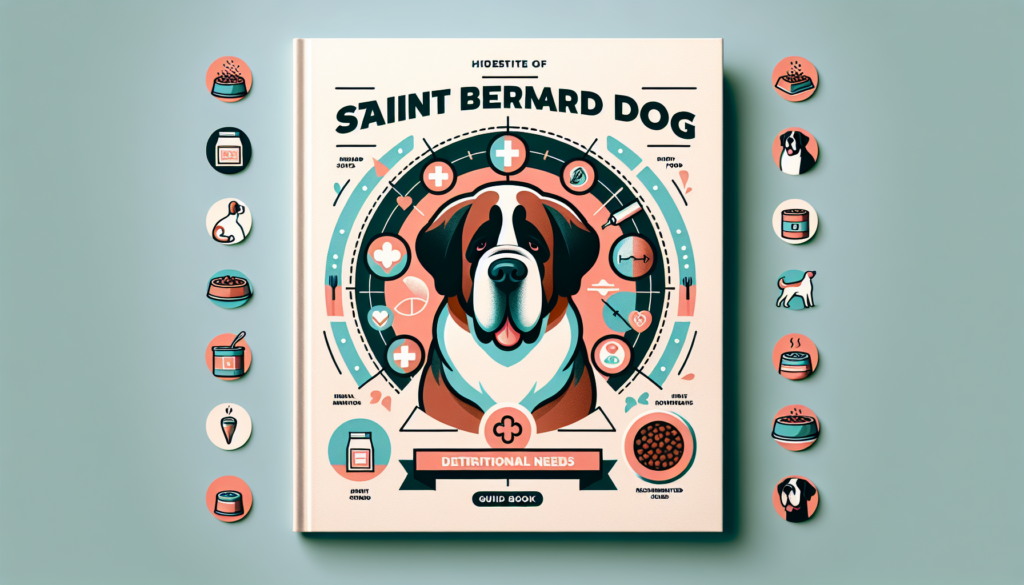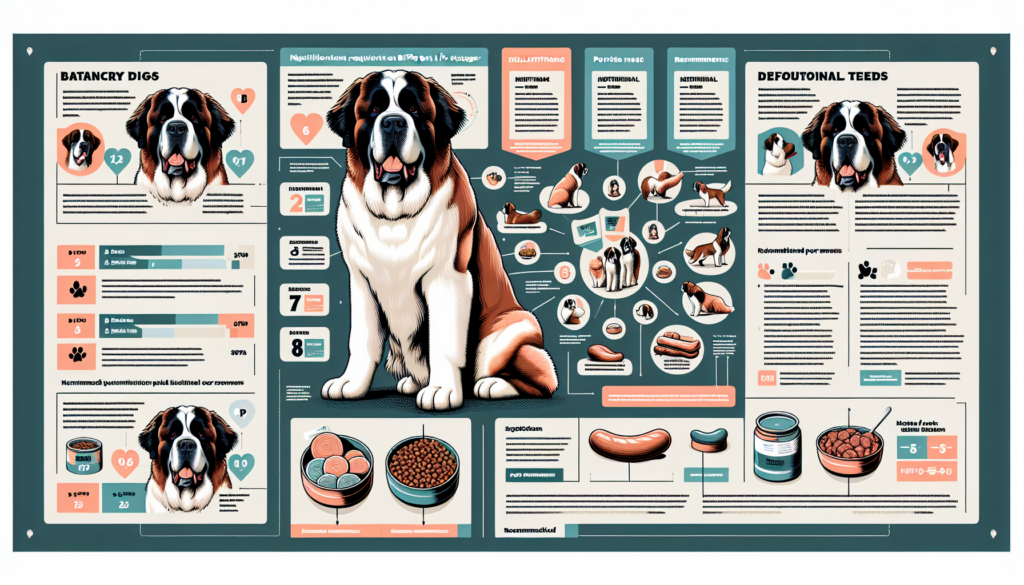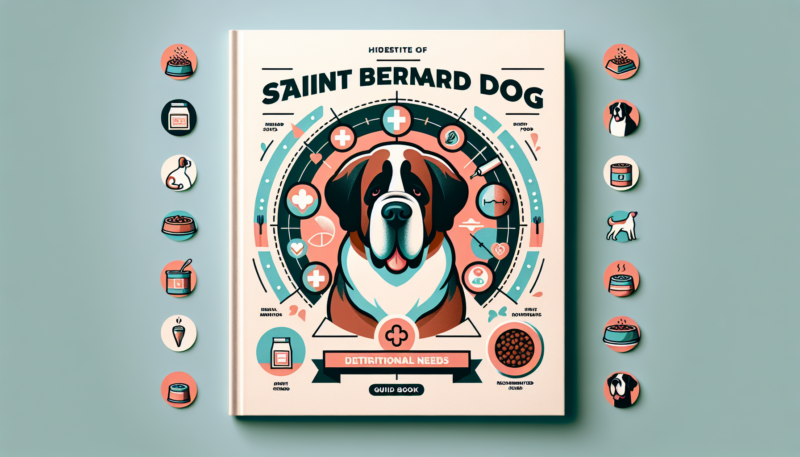Are you the proud owner of a lovable Saint Bernard? Well, if you’re wondering what to feed your furry companion, look no further! In this detailed guide, we will explore the dietary needs of Saint Bernards, providing you with all the essential information to ensure your gentle giant stays healthy and well-nourished. From the ideal balance of proteins and carbohydrates, to recommended portion sizes and special dietary considerations, this article has got you covered. So, let’s dive right in and discover the perfect diet for your beloved Saint Bernard.
A Guide to Saint Bernard’s Diet

Overview of Saint Bernard’s Diet
When it comes to feeding your beloved Saint Bernard, it’s important to provide them with a balanced and nutritious diet. Proper nutrition plays a crucial role in their overall health and well-being. In this comprehensive guide, we will explore everything you need to know about your Saint Bernard’s diet, from understanding their nutritional needs to choosing the right food and creating a feeding schedule that works for them.
Understanding Nutritional Needs
Saint Bernards have specific nutritional requirements that must be met to ensure their optimal health. As a large breed, they require a diet rich in essential nutrients such as protein, fat, carbohydrates, vitamins, and minerals. Protein is particularly important for their muscle development and support, while fat provides them with a concentrated source of energy. Carbohydrates supply the necessary fuel for their daily activities, and vitamins and minerals promote overall well-being.
To determine the appropriate nutritional needs for your Saint Bernard, it’s best to consult with a veterinarian. They can provide you with specific guidelines based on your dog’s age, weight, activity level, and any pre-existing health conditions.
Choosing the Right Food
Selecting the right food for your Saint Bernard is vital to their overall health and happiness. There are several factors to consider when making this decision. Firstly, you need to decide between puppy food and adult food. Puppies require a diet that supports their growth and development, while adult dogs have different nutritional needs. It’s essential to transition them to adult food at the appropriate age.
Additionally, you’ll need to choose between dry kibble and wet canned food. Both options have their advantages and disadvantages. Dry kibble is convenient and helps promote dental health, while wet canned food offers higher moisture content and can be more palatable for some dogs. It’s a personal preference, but ensuring that the food you choose meets the nutritional requirements for your Saint Bernard is crucial.
When selecting commercial dog food, it’s important to read labels and ingredients. Look for high-quality brands that use premium ingredients and avoid those that contain fillers and artificial additives. Consider breed-specific formulas that cater to the unique needs of Saint Bernards, such as joint health support or weight management.
Lastly, always consult with your veterinarian before making any changes to your dog’s diet. They can provide valuable insight and recommend specific brands or formulas that are best suited to your Saint Bernard’s needs.
Feeding Schedule
Establishing a proper feeding schedule is essential to maintain your Saint Bernard’s health and prevent overfeeding or underfeeding. The number of meals your dog needs per day will vary depending on their age and activity level. As a general guideline, puppies require more frequent meals, while adult dogs can typically eat two meals a day.
Portion control is crucial to prevent obesity and maintain a healthy weight for your Saint Bernard. Measuring your dog’s food is recommended to ensure accurate portion sizes. It’s essential to avoid overfeeding, as Saint Bernards are prone to weight gain, which can lead to other health issues.
Consistency is key when it comes to feeding times. Establishing a routine and sticking to it will help regulate your dog’s digestive system and prevent any issues. If you need guidance on how much food to feed your Saint Bernard at various life stages, consult with your veterinarian or refer to the feeding guidelines provided by the dog food manufacturer.

Water Consumption
Providing your Saint Bernard with access to fresh and clean water is crucial for their health and well-being. Proper hydration is essential for various bodily functions and helps regulate body temperature. It’s recommended to have multiple water bowls throughout your home to ensure your dog always has access to water.
The amount of water your Saint Bernard needs will depend on factors such as their size, weight, activity level, and the climate they live in. It’s important to monitor their water intake and ensure they are drinking enough to stay properly hydrated. If you notice any changes in their water consumption, it could indicate an underlying health issue, and you should consult with your veterinarian.
Commercial Dog Food Options
Commercial dog food provides a convenient and balanced option for feeding your Saint Bernard. There are a few different types of commercial dog food available, including dry kibble, wet canned food, and semi-moist food. Each type has its own benefits and drawbacks, and your decision will depend on your dog’s preferences and specific dietary needs.
When choosing commercial dog food, it’s important to understand how to read labels and ingredients. Look for high-quality brands that use real meat as the primary ingredient and avoid those that contain excessive fillers, by-products, and artificial additives. It’s also worth considering breed-specific formulas that are tailored to the specific needs of Saint Bernards, such as joint support or weight management.
While commercial dog food can be a convenient option, it’s important to remember that not all brands are created equal. Consulting with your veterinarian can help you make an informed decision and select a high-quality brand that meets your Saint Bernard’s nutritional requirements.
Homemade Diet
Some pet owners prefer to prepare homemade meals for their Saint Bernards. While this can be a rewarding experience, it requires careful attention to ensure proper nutrition and balance. Homemade diets can be beneficial as they allow you to have full control over the ingredients and can be tailored to your dog’s specific needs.
However, there are some considerations to keep in mind when opting for a homemade diet. It’s crucial to ensure your dog’s meals are nutritionally balanced, meaning they contain the right proportion of protein, fat, carbohydrates, vitamins, and minerals. Consulting with a professional, such as a canine nutritionist, is highly recommended to create a well-rounded homemade diet plan for your Saint Bernard.
When preparing homemade meals, it’s important to choose safe and healthy ingredients. Good protein sources include lean meats, such as chicken, beef, or turkey, as well as fish and eggs. Vegetables and fruits can provide additional vitamins and fiber. It’s crucial to avoid any ingredients that can be toxic to dogs, such as chocolate, onions, garlic, or certain spices.
Adding Supplements
Supplements can be a beneficial addition to your Saint Bernard’s diet, but it’s essential to use them judiciously and consult with your veterinarian before adding any to their routine. Supplements can help address specific nutritional deficiencies or support your dog’s overall health and well-being.
There are various types of supplements available, such as joint supplements, probiotics, fish oil, or multivitamins. Each supplement serves a different purpose, so it’s important to understand your dog’s specific needs before introducing any supplements. Your veterinarian can provide guidance on the appropriate dosage and recommend reputable brands.
It’s crucial to exercise caution when adding supplements to your dog’s diet. Overdosing can lead to adverse effects, and certain supplements can interact with medications or cause toxicity. Always follow the recommended dosage provided by the manufacturer or as advised by your veterinarian.
Foods to Avoid
While there are many safe and healthy foods for your Saint Bernard, there are also several foods to avoid. Some human foods can be toxic to dogs and should never be given to them. Common foods that can be harmful include chocolate, onions, garlic, grapes, raisins, caffeine, alcohol, and certain nuts. It’s important to be aware of these foods and ensure they are kept out of your dog’s reach.
Additionally, some dogs may have specific food sensitivities or allergies. These can manifest as skin irritations, gastrointestinal issues, or other allergic reactions. It’s important to monitor your dog’s response to certain foods and consult with your veterinarian if you suspect any sensitivities or allergies.
Special Dietary Considerations
There are certain special dietary considerations to keep in mind for Saint Bernards. Some dogs may have digestive issues or sensitive stomachs, requiring a specialized diet that is gentle on their digestive system. Others may be prone to weight gain, necessitating a weight management plan. Additionally, certain health conditions may require a specific diet to manage symptoms or support recovery.
Puppies also have unique dietary requirements, as they are still growing and developing. It’s essential to provide them with a balanced and nutritious diet that supports their growth and promotes healthy bone and muscle development.
If your Saint Bernard has any specific dietary needs or health conditions, it’s crucial to consult with your veterinarian. They can provide guidance on the best diet and nutritional plan for your dog’s individual needs.
In conclusion, providing your Saint Bernard with a balanced and nutritious diet is essential for their overall health and well-being. Understanding their nutritional needs, choosing the right food, establishing a feeding schedule, and considering special dietary considerations are all important aspects of caring for your dog. By following this comprehensive guide and seeking guidance from your veterinarian, you can ensure that your beloved Saint Bernard receives the optimal nutrition they need to thrive.
